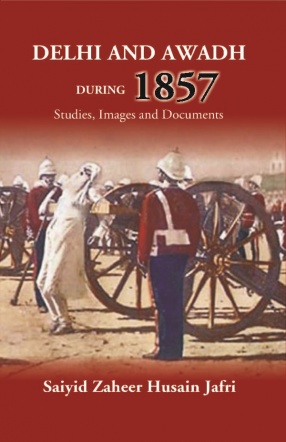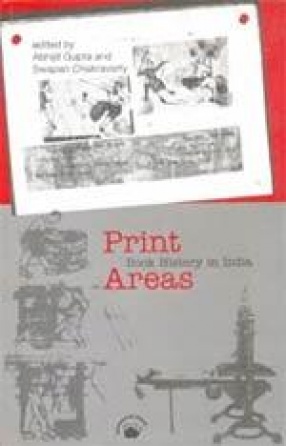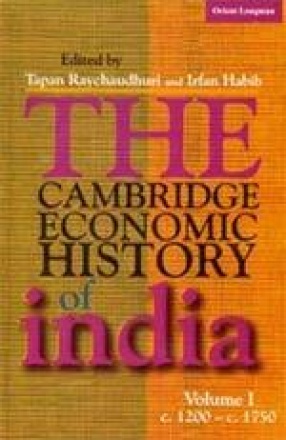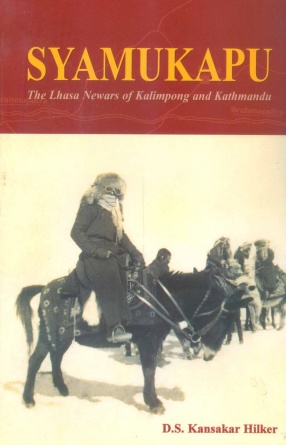Delhi and Awadh During 1857 Studies, Images and Documents
The volume undertakes to analyze major themes and issues in the study of the revolt of 1857, the largest anti-imperialist uprising th throughout the annals of 19 century. Though unsuccessful, yet it shook the foundations of British imperialism in such a way that saved many Asian countries 'falling prey to the clutches' of the colonial rule. The chapters are based extensively on the 'printed word' from the 'world of the rebels', official mutiny papers and memoirs written soon after the event. A peep into the 'vision of the vanquished' from their narratives, and not just from 'victors recollections' is perhaps the theme highlighted throughout the book. Seminal studies from the leading historians of South Asia and young scholars engaged in an in depth study of the subject are included, not only to fill the numerous gaps to the existing works, but to provide a perspective for understanding this momentous event which undoubtedly shook the basis of the 'Indo- Islamic past' of the millennium, especially at the Mughal capital of Delhi and of the Nawabi regime at Lucknow. Chapters on Dehli Urdu Akhbar, Tilism e Lucknow and the memories, compiled at the penal colony of Andaman, full with bitterness and frustration, offer fresh data for a better understanding. The process/es of 'marginalization of the erstwhile elite' through the resumption of land rights, the destruction of the libraries, books and centers of learning, the aggressive phase/es of proselytization by the missionaries are important themes taken up. The images and documents are included to highlight the 'quasi-modern' nature of the rebel mobilization; the use of printing medium, the drafting of a remarkably ahead of its time dastur-ul amal for the governance by the rebels; the memory of the event after the rebellion was suppressed are here to highlight the important, yet neglected aspects of the subject.
Contents: Preface. 1. Remembering/Irfan Habib. 2. The Sepoys and Middle Class Citizenry into the Making of Rebellion/Irfan Habib. I. The Indigenous voices From Rebels: 3. Rebel Journalism: Dehli Urdu Akhbar, May-September 1857/Shireen Moosvi. 4. Lucknow between the Annexation and the Mutiny/Iqbal Husain. 5. ‘Voices’ of the ‘Vanquished’: The ‘Indigenous Discourse’ in the Rebels’ World of 1857/S. Zaheer Husain Jafri. 6. The Rebel Administration of Delhi, 1857/Iqbal Husain.II. The Making of 1857: 7. Religious Debates and the Making of 1857 in Northern India/Farha Khan. 8. ‘Royals’, Property and Prize Agents: Fate of the Mughal Capital in the aftermath of 1857/Nida Arshi. 9. The Battle for Delhi, Meos and the Great Uprising: A Study of Anti-British Resistance during 1857/Zakir Husain. 10. Communitarian Relations, Colonial Remodeling, and the British in Pre-Mutiny Awadh/Heena Ansari. III. Deologues and Commanders: 11. Fazl-e Haq Khairabadi: A Scholarly Rebel of 1857/Iqbal Husain. 12. Bakht Khan: A Leading Sepoy General of 1857/Iqbal Husain. 13. Maulavi Liyaqat Ali/Iqbal Husain. 14. Indigenous Discourse and Modern Historiography of 1857: The Case Study of Maulavi Ahmadullah Shah/S.Zaheer Husain Jafri. IV. Suppression and Reign of Terror: 15. William Hodson and the Abduction of Bahadur Shah Zafar/Amar Farooqui. 16. The Battle for Delhi: Myths and the Construction of the Raj/Madhu Prasad. 17. The Concept of Booty, Revolt of 1857 and Delhi as a ‘Prize/Shaheen Islamuddin. 18. Masjid-e Jahan Numa at Shahjahanabad during and after the Uprising of 1857/Sadia Aziz. 19. Fishing in the Troubled Waters: The Revolt of 1857 and Jung Bahadur Rana, the Prime Minister of Nepal/S. Najmul Raza Rizvi. V. The Memory: Khwaja Hasan Nizami of the Dargahof Hazrat Nizamuddin Auliya, and his Reminiscences of 1857. 20. Literature, History and Memory: A study of the Selected Writings of Khwaja Hasan Nizami on 1857/S. Zaheer Husain Jafri. Index.
Get it now and save 10%
BECOME A MEMBER







Bibliographic information